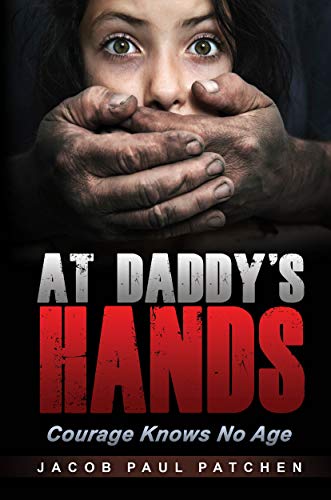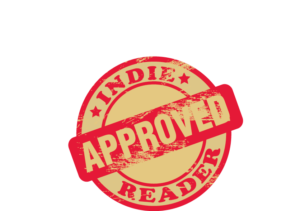At Daddy’s Hands: Courage Knows No Age received a 4+ star review, making it an IndieReader Approved title.
Following find an interview with author Jacob Paul Patchen.
What is the name of the book and when was it published?
At Daddy’s Hands: Courage Knows No Age (September 05, 2019)
What’s the book’s first line?
Jim Handler had just shoved his way through a mess of shoes, book bags, and jackets piled in front of the door.
What’s the book about? Give us the “pitch”.
A small-town hero detective preys upon his family in the form of sexual, mental, and physical abuse. But they have had enough. After the justice system fails to serve them justice, they take matters into their own hands.
What inspired you to write the book? A particular person? An event?
The idea to write a book like this transpired during my time working in the mental and behavioral health field. I was able to see, firsthand, what sexual, mental, and physical abuse can to do a child. During that time, one of my biggest revelations was that this form of trauma seems to be linear and trickle down from generation to generation. I wanted to write a book about this taboo subject to bring awareness, inspire courage, and to show victims and survivors that they are not alone and that there are good people out there who want to help.
What’s the main reason someone should really read this book?
Honestly, I think everyone should read this book and feel disgusted that these types of scenarios run rampant throughout our communities on a daily basis. I would like to hope that this book could be a tool to inspire change and revolution. It is also a great read for those who would like to try and understand some of the motivations for the behaviors that surround this epidemic.
What’s the most distinctive thing about the main character? Who-real or fictional-would you say the character reminds you of?
Great question. At Daddy’s Hands takes a look at five main characters and their different symptoms/behaviors revolving around sexual, mental, and physical abuse. But I think the underlining theme with four of the five main characters is that they ultimately have the power, courage, strength, and support to take a stand against this evilness and break the chain that bounds their family in darkness for the next generation.
When did you first decide to become an author?
I started writing poetry when I was twelve years old and would continue to write all through high school and college. But being from a small town – an area where people don’t particularly veer far from the path of construction or nursing jobs – I never thought that I really had a chance to make my hobby a career until January of 2018 when I had both a children’s series and poetry book accepted for publication. It was only then that I discovered the validation, inspiration, and determination to make writing a career. Two months later, I started writing At Daddy’s Hands.
Is this the first book you’ve written?
This is my first novel, but not my first book. I self-published my first book, a creative nonfiction memoir called, Life Lessons from Grandpa and His Chicken Coop: A Playful Journey Through Some Serious Sh*t, in 2015. Next, in 2017 I self-published a collaboration of my social/humor blog and titled it, Talking S.H.I.T. (Social, Humorous, and Inspirational Thoughts). 2018 would see my long-awaited poetry manuscript, Of Love and War about my deployment to Iraq as an infantry Marine, the ending of a long-term relationship the night I returned home, and the years of struggle, drinking, PTSD, and failed relationships after. At Daddy’s Hands is my first fiction novel and fourth published book.
What do you do for work when you’re not writing?
For a couple of years, anything that I could – (it was such a struggle to find a career job when I felt/knew that I was meant for something else). Now, I’m a Learning Consultant at Muskingum University and I work as a handyman on the side during the summer (still waiting for that big break – here’s to hoping that At Daddy’s Hands is it).
How much time do you generally spend on your writing?
It’s such a difficult task to be a writer and balance the rest of your life. It demands a big part of your time and creativity. It took a while to find a good rhythm for that balance. But now, I spend about an hour or two a day on writing-related tasks. When I’m actually writing (because there is SOOOO much more to being an author than JUST writing), I usually spend anywhere from two to six hours a day in front of the keyboard.
What’s the best and the hardest part of being an indie?
Best part – The small, close-knit feel and friendship with your publisher and other writers, as well as more control in the decision making process of your book.
Worst part – Maybe the feeling that you still have such a mountain to climb, that maybe you haven’t “made it” yet. Perhaps, not getting the best exposure due to a small press that many have not heard of.
What’s a great piece of advice that you can share with fellow indie authors?
Hmm. Well, for me, I know how much of a struggle it was to get “this” far. I still remember my very first accepted piece for publication – two poems – and that feeling of “wow, I just became a published writer.” Little did I know, that the journey was just beginning and that it would be full of failures, headaches, frustrations, and second-guesses. The hardest part about being a new writer is believing in yourself. After all, aren’t we our biggest critics?
So, my advice would be to trust that little feeling deep down inside of your soul that is screaming (in a very fierce but tiny voice) “I am a writer! I am a writer!” You started on this wretched and rewarding trail for a reason. When it gets rough, look back to that for inspiration. Because, if there’s one thing I’ve learned that I need the most when writing, it’s inspiration.
Would you go traditional if a publisher came calling? If so, why?
I would consider all options on the table. I have a plan, and it’s to write for a living. I will do what needs to be done to reach that goal. But, if I ever move on from small presses, I’ll never forget those who first saw what my work could become and those who believed in me.
Is there something in particular that motivates you (fame? fortune?)
My motivations from the beginning (back when I was twelve years old writing poems in the back of my school notebooks) were merely for self-satisfaction. It felt good to think deeply and create a moving piece. It was therapeutic, exciting, and gratifying. It still is to this day. But now, I realize that my work could inspire and move others to change or do better. I think that idea – trying to help and impact others in a positive way – is quickly becoming my biggest motivation. And Hell, if fame and fortune happen to come along with that, I won’t turn a cold shoulder.
Which writer, living or dead, do you most admire?
Don’t hate me, but the truth is, I’m not a big reader. I never really have been. I think that stems from being forced to read in school (I’m VERY stubborn). But, since poetry is my roots, I think I have to admire those confessionalist poets, like Robert Lowell, Sylvia Plath, and Anne Sexton. I can appreciate those who confront the true, emotional, and powerful connections of life.

